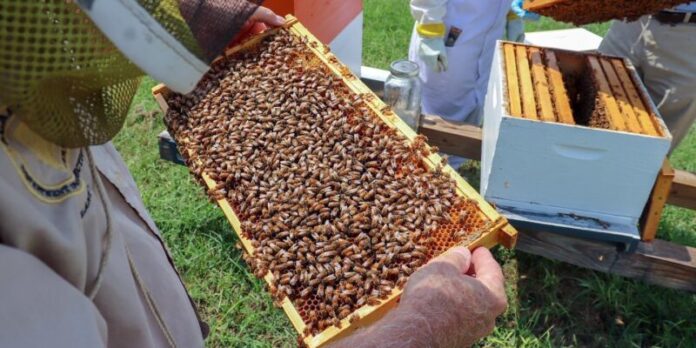MONTGOMERY – The Alabama Department of Agriculture and Industries (ADAI) has confirmed the presence of Africanized Honeybees (AHB) in Jackson and St. Clair Counties. Both finds were feral swarms collected by local beekeepers and have been euthanized to protect Alabama’s honeybees.
ADAI is taking swift action to mitigate any risks associated with these invasive bees. Traps are being set up within a five-mile radius of the detection sites to capture and identify any further presence of AHB. This proactive measure aims to assess the extent of AHB infiltration and prevent future attacks.
Additionally, ADAI is reaching out to all beekeepers in the vicinity of the positive finds. Beekeepers are being advised on the identification and management of AHB and are encouraged to report any suspicious bee activity. ADAI will be collecting samples as needed to ensure the thorough monitoring of the situation.
“Our goal is to protect both our residents and the health of our local bee populations,” said Commissioner of Agriculture & Industries Rick Pate. “We are working diligently to monitor the situation and taking necessary actions to prevent the spread of these aggressive bees.”
Africanized Honeybees differ from European Honeybees (EHB) in behavior not appearance. Neither type of honeybee will indiscriminately attack humans or animals. Stinging is a defensive behavior employed by the colony to protect their brood (young bees) and food supply.
Differences in AHB and EHB are:
- AHB are more defensive than EHB.
- AHB are more easily disturbed and respond in greater numbers than EHB.
- AHB may swarm as often as every six weeks, while EHB generally only swarm once a year.
- AHB will nest in any available cavity or in the open. Nest sites include, water meter boxes, metal utility poles, cement blocks, junk piles, and house eaves. Other potential nesting sites include overturned flowerpots, old tires, mobile home skirts and abandoned structures. Holes in the ground and tree limbs, mailboxes, even an empty soda pop could be viewed as “home” to the AHB.
- EHB nest in larger cavities above ground and sometimes in the open. EHB do not nest in holes in the ground. Nest sites include, a beekeeper’s hive, hollow trees, cavities in walls and occasionally on a tree limb.
- AHB will pursue a threat for over a mile where EHB will only pursue a threat for a few hundred yards.
The public is urged to stay vigilant and report any unusually aggressive bee behavior to ADAI. Africanized Honeybees can be highly defensive and pose a risk to humans and animals. It is important to avoid provoking any swarms and to seek professional assistance for bee removal.
If you believe you have found a colony of Africanized Honeybees, contact the ADAI’s State Apiary Unit at (334) 240-7228 or (334) 240-7172. For any additional information about honeybees visit, agi.alabama.gov/plantprotection/apiary-protection-unit/




